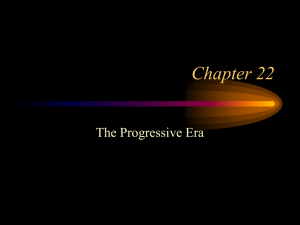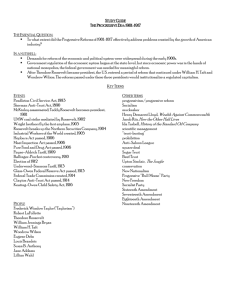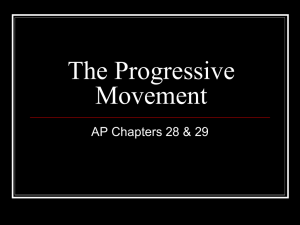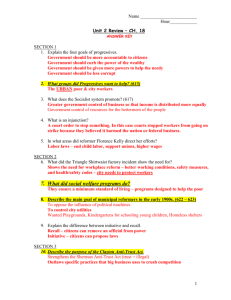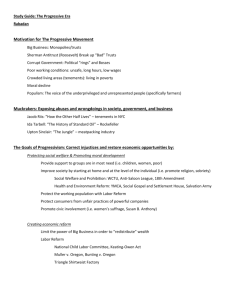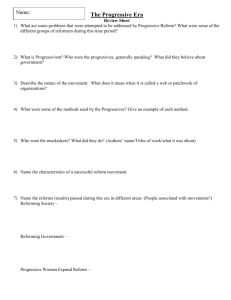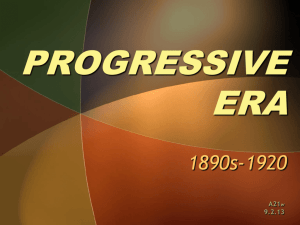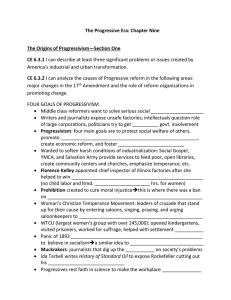PROGRESSIVE ERA
advertisement
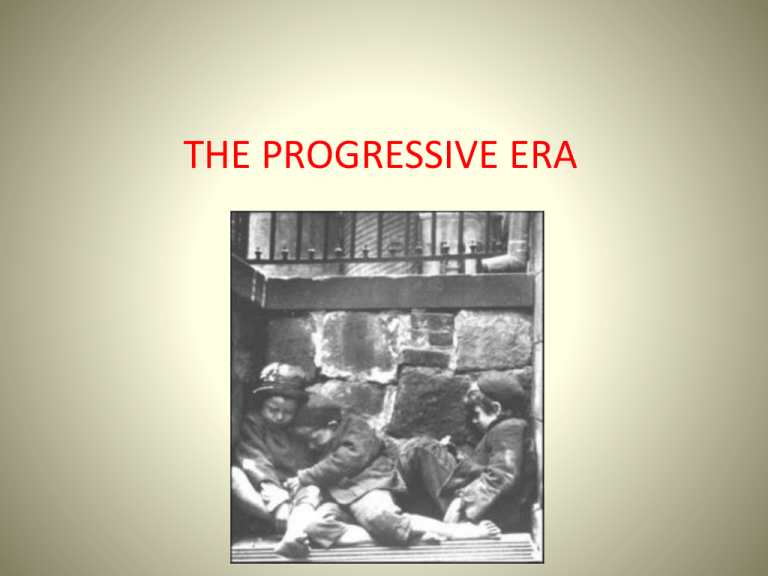
THE PROGRESSIVE ERA Progressive Roots • Sources of Strength: – 1. Farmers – As Populism lost steam, famers held onto the desire for change. – 2. Urban Middle Class/Social reformers- Alarmed by the power of corporations and political machines. Troubled by urban decay. – 3. Workers – Sought reform to protect workers from corporate excess, poverty, and work place dangers, – 4. Writers – Journalists that analyzed social ills. Muckrakers Muckrakers & Reformers • Muckrakers – Name given by T.R. to journalists that sought social reform by exposing the ills of the day. • McClure’s Magazine was the home of many of these articles. • Held the idea that the cure for the ills of democracy was an informed and active citizenry. Reform • Social Gospel: Protestant intellectual movement. Applied Christian ethics to social problems. • Settlement movement: goal to deal with the vast gap in wealth. – Object was to establish ‘settlement houses’ in poor urban areas • Provided educational, recreational, and social services to the community. • Jane Addams - Settlement House: Hull House in Chicago. • Jacob Riis – “How the Other Half Lives” -. State Reforms • Reforms in the workplace – Safety – Labor departments (provide info & dispute resolution services) – Workers’ accident insurance & compensation – Banned child labor (under age 14) – Set minimum wage laws Political Reform • State reforms focused on giving more power to voters – Direct primary (citizens vote to select nominees for upcoming elections) – Initiative (citizens can put a proposed new law directly on the ballot in the next election by collecting voters’ signatures on a petition) – Referendum (citizens can approve or reject a law passed by a legislature) – Recall (allows voters to remove public officials from office before next election) National Reforms – – – – 16th Amendment : Clarification of the income tax 17th Amendment : Direct election of Senators 18th Amendment : National prohibition of alcohol 19th Amendment : Universal Suffrage The Progressive Era had four constitutional amendments within 7 years. th and There were 43 years between the passage of the 15 th and 16th Amendments, and another 12 between the 19 20th Amendments. IV. Social Ills & Solutions • The emergence of modern America brought social issues into sharp view • The economy had modernized, but many parts of society and the culture lagged behind. • Progressives sought the modernization of systems to deal with the pressing social ills Moral Reform: Temperance • Reformers viewed alcohol as cause for social ills – crime, unemployment, prostitution, wasting of wages, hurts family • Carrie Nation: – radical temperance reformer. – Noteworthy for vandalism, frequently attacking taverns with a hatchet • Anti-Saloon League & Women’s Christian Temperance Union – Connect alcoholism and the modern economy Women and Reform • Women were often at the fore of reform efforts – Child labor and temperance – Increased access to education – Visible in public life and social reform • Reform accomplishments: prohibition, federal Children’s Bureau, etc. Child Labor • In 1900 about 1 in every 6 children between the ages of five and ten were engaged in "gainful occupations – Fifty percent increase from 1880. – National Child Labor Committee campaigned against child labor • Sociologist Lewis Hine used photography to stimulate reform. – Successful on state level to ensure minimum age laws. Women’s Rights • The modern economy created a larger middle class, and thus a larger bloc of educated women • Women had pushed for many of the Progressive reforms, but lacking the right to vote, focused women’s concern for suffrage • National American Woman Suffrage Association (NAWSA) formed in 1890 – United National Woman Suffrage Association & American Woman Suffrage Association. • Change of strategy: sought federal constitutional amendment • WWI: women able to “prove themselves” • 19th Amendment ratified (1920) • New generation of suffragettes – Carrie Chapman Catt – pres. of NAWSA • Argue vote broadens democratic role of women in caring for families – Alice Paul • militant of taking it to the streets; hunger strikes; focus on amendment – 19th Amendment (1920) passed to reward women for role in WWI Women’s Suffrage Carrie Chapman Catt: 1859-1947 Maud Wood Park: 1871-1955 Lucy Burns 1879-1966 Alice Paul:18861977 THE STRUGGLE FOR WOMEN’S SUFFRAGE 18 VI. National Politics National Politics • Election of 1900 – William McKinley (R) vs. William Jennings Bryan (D) – Campaign on domestic issues: currency, tariff – McKinley wins – Assassinated in 1901 – VP Teddy Roosevelt takes over The Roosevelt Era • Activist conservative, moralist, internationalist – Antitrust prosecution of the Northern Securities Company – Environmental conservation: Gifford Pinchot, U.S. Forest Service • Election of 1904 – Landslide victory – Square Deal – domestic program formed upon three basic ideas: conservation of natural resources, control of corporations, and consumer protection • Policy debates over monopoly, various strategies for regulation – Pure Food and Drug Act, Meat Inspection Act resulting from Upton Sinclair’s The Jungle • • • • In 1902, Roosevelt instituted an antitrust suit against ta railroad holding company – Northern Securities Company. – First president to push enforcement of Sherman Antitrust Act 1904 – Northern Securities Co. v. United States – 5-4 decision by court against the trust. – Northern Securities had to disband, and each RR had to be run independently. – Opens door for further anti-trust cases. TR & Atty. Gen. took on about 40 trusts Stated that bad trusts harmed public & stifled competition, while regulated good trusts Trustbusting Consumer Protection • Influenced by The Jungle (1906) • Pure Food and Drug Act forbade the manufacture, sale, & transportation of adulterated or mislabled food and drugs • Meat Inspection Act provided that federal inspectors visit meatpacking plants to ensure they met minimum standards of sanitation Conservation vs. Preservation • TR’s most original & lasting contribution • Repeated use of the Forest Reserve Act 1891 – set aside 150 mil acres of federal land as a national reserve • White House conference on conservation – est. National Conservation Commission OTHER TR CONSERVATION ACCOMPLISHMENTS • 150 National Forests • 51 Federal Bird Reservations • 4 National Game Preserves • 5 National Parks • 18 National Monuments • 24 Reclamation Projects Pro Con • Trust-busting – twice as many • Taft aligns himself with the Old Guard, gutting many of • Conservation – Bureau of Mines; added large tracts in Roosevelt’s Square Deal Appalachia to reserve; 1st pres. policies. to set aside oil reserve • Fired Forestry Director th • 16 Amendment – Pinchot and weakened Progressive income tax National Forest Service (originally applied to very wealthy Through Roosevelt’s Eyes: Taft’s Presidency Election of 1912 • Reps nominate Taft • TR splits & forms Progressive Party (Bull Moose party) • Dems nominate Woodrow Wilson • Taft represents the Old Guard, pro-business Republicans, Roosevelt Progressive Republicans, and Wilson Progressive Democrats. • SPLIT VOTE! New Nationalism • Continue with powerful regulatory agencies • Woman suffrage • Broad program of social welfare – Minimum wage – Social insurance New Freedom • Favored small enterprise, entrepreneurship, & free functioning of unregulated & unmonopolized markets • Banking reform • Tariff reductions • Shunned social programs TR vs. Wilson Wilson’s Presidency • Attacks the “triple wall of privilege” – Tariffs – Banking – Trusts • Seeks to restore competition • Favors rights of unions and working man • Wilson introduces the New Freedom: – New Freedom was Wilson’s social program for the US • Federal Reserve Act 1914 (National Bank is back) – National banking system of 12 district banks – Supervised by Federal Reserve Board – Oversees currency • Federal Trade Commission 1914 – Consumer protection. The FTC oversees business practices in US. Responsible for eliminating monopolies. • Federal Trade Commission 1914 – investigate & take action against “unfair trade practice” New Freedom Effects of the Progressive Movement Political • Party primaries • Decline of political machines • Votes for Women Social Economic • Laws protecting workers • Settlement houses & social work • Birth control for women • Beginning of rights for African Americans • Prohibition of alcohol • Regulation of unsafe food & drugs • Conservation of land, water, & other resources • Regulation of business • Lower tariffs • Federal in come tax • Some victories for workers
